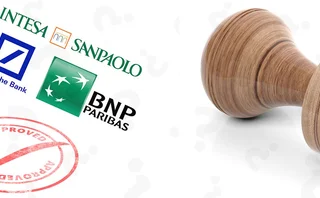
Calls for rating agency regulation fuel debate
A number of financial associations have called for more rating agency regulation, but have some of their proposals gone too far? Hardeep Dhillon reports

Bankers and fund managers have kept a keen, maybe even quivering, eye on the actions of the rating agencies towards US automakers, in particular the outlook change at Standard & Poor’s on Ford. But others in the marketplace have the rating agencies themselves firmly in their sights, as a number of international associations have called for further regulation in the ratings process.
The debate on greater oversight of the activities of credit rating agencies has widened to include the Association for Financial Professionals (AFP), the Bond Market Association (BMA) and the International Organisation of Securities Commission (Iosco). These associations have all been prompted to put forward proposals for how the rating process can be improved.
The AFP believes that the Securities & Exchange Commission (SEC) should increase its regulation of the rating agencies and outline the criteria by which it awards its coveted NRSRO status (nationally recognised statistical rating organisation).
Jim Kaitz, president and CEO at the Bethesda, Maryland-based AFP, believes that confidence in the credit rating process continues to be low among financial professionals and restoring issuer and investor confidence in the credit rating process is critical to global capital markets. “Because ratings play a critical role the SEC must become more actively involved to encourage greater competition among the rating agencies, foster innovation and oversee the process,” he says.
AFP members, according to results of the US corporate finance body’s 2004 Credit Rating Survey, believe the SEC should take a greater role in overseeing the rating agencies. They also propose that agencies should document the internal controls they have in place to protect against conflicts of interest. In addition, regulators should require rating agencies to document and implement policies and procedures to prevent the disclosure of non-public information.
The Bond Market Association is putting further pressure on regulators to tighten up controls over agencies by proposing external certification. And though the question remains of who should rate the raters – the BMA has come out with no formal recommendations – national regulators or the European Union’s Committee of European Securities Regulators (CESR) could take on this role. The CESR is currently working on proposals for change, due to be put to the EU next spring.
Code of conduct
The BMA also wants rating agencies to periodically confirm their compliance with a code of conduct for credit rating agencies, a draft of which was published at the end of October by Iosco.
This Code of Conduct for Credit Rating Agencies is designed to be a set of measures that should be included in some form or fashion in the constitution of individual rating agencies. The measures are not intended to be rigid or formalistic, though Iosco envisions securities regulators to enforce the proposals in a number of ways. These range from directly overseeing compliance, enforcement by an external arbitration body or relying on market mechanisms.
The consultation period of the code was extended to November 23 from the original November 8 deadline due to the large range of responses received. Andrew Larcos, public affairs officer at Iosco in Madrid, says that a final position on the code is expected early next year.
However, even before the deadline had been reached, the draft code had already raised eyebrows among market participants, in particular Item 3.11 of the code that proposes more public disclosure of confidential information:
Where a CRA [credit rating agency] is made aware of non-public information of the kind required to be disclosed under applicable laws and regulations, depending on the jurisdiction, the CRA may be obligated to make this information available to the public. However, prior to doing so, the CRA should indicate to the issuer its intent to release this information and permit the issuer to immediately disclose the information itself. The timeframe a CRA should provide an issuer to make this disclosure should be limited.
International treasury associations – the US’s AFP, the UK’s Association of Corporate Treasurers (ACT) and the French Association Française Des Trésoriers D’Enterprise – and rating agency, Standard & Poor’s believe that this item is too intrusive and have gone as far as asking for its removal.
The ACT believes that issuers should abide by disclosure rules applicable to them, but rejects the idea that rating agencies should be required to publicise confidential information they receive from companies. Making public price-sensitive information would totally change the relationship of trust needed for issuers to make full and proper disclosure to a rating agency, to the detriment of issuers and investors, Martin O’Donovan, ACT technical officer warns.
“It is not really Iosco’s job to act as policeman for the securities regulators. If they take on an auditor/policeman role, then companies will be cautious in what they hand over: rather than being forthcoming with information, they will be more guarded,” he says.
Vickie Tillman in credit market services at S&P in New York concurs that issuers would err on the side of caution and not reveal information they feared would be made public. “The end result would be less information on the ratings process and a serious diminishment of the utility of rating opinions in the market,” she says.
Tillman also believes that this provision would place agencies under intense pressure to make complex legal decisions on whether the non-public information they receive from thousands of issuers is “the kind required to be disclosed”. She adds that it is not the job of the rating analyst, nor are they qualified, to make such decisions. To comply with Item 3.11, agencies would have to employ and consult on a daily basis expert securities lawyers in each jurisdiction.
For the most part, treasury associations and rating agencies are in support of the Iosco code and the majority of its proposals. “We welcome the broad direction of the code as it is a constructive and helpful way of achieving light regulation. Ultimately we believe that the market is the best mechanism to maintain standards and any whiff of impropriety will lead to reputation risk for the rating agencies. Reputation is everything for a rating agency,” says ACT’s O’Donovan.
S&P’s Tillman also believes that market mechanisms are the most effective and appropriate means for applying the code’s provisions. “The market’s acceptance and utilisation of a rating agency’s ratings are and always have been the benchmarks for measuring that agency’s success. Market participants simply do not accept or use rating opinions that lack a demonstrated track-record of objectivity, independence and rigour,” she says.
| Questioning the quality of ratings If demands for greater regulation were not enough, the quality of ratings that the rating agencies provide has also been subjected to scrutiny. According to the Association for Financial Professionals’ 2004 Credit Rating Survey, US corporate finance professionals believe that the accuracy and timeliness of ratings needs to be improved. Of the 225 corporate finance professionals that were polled, one-third of respondents stated that the ratings on their organisation’s debt are inaccurate, while only 42% believe changes in their company’s rating are made on a timely basis. The results mirror those of a similar survey conducted by the AFP in 2002. “Despite the headlines in the news over financial scandals and hearings in Congress, the situation has not improved. More than a decade ago the Securities & Exchange Commission raised this issue and two years ago the SEC asked for comments on the credit rating process. Yet they have failed to act to improve this important function that is critical to global capital markets,” says Jim Kaitz, AFP president and CEO. Responses from the rating agencies have been lukewarm at best and sentiment is that the results should be taken with a pinch of salt. “The results come as no surprise, as the AFP is talking to a biased audience. There is a natural tension between rating agencies and corporate issuers – it’s a bit like asking patients how they feel about going to the dentist,” says Paul Taylor, group managing director at Fitch Ratings. Martin Winn at Standard & Poor’s in London concurs: “We acknowledge that the survey reflects the views of a particular segment of the market, ie, issuers, and that it is not uncommon for issuers to disagree with our rating opinions.” Despite the opposition among treasurers, rating agency officials focus on the positive slant of the AFP’s findings. For Frances Laserson, in Moody’s global corporate communications department in New York, the results are very encouraging. “The overwhelming majority of respondents believe that ratings are accurate and timely. Having such a high acceptance means that we are doing a good job of providing credit opinions,” she says. Fitch’s Taylor emphasises this point. “In fact, the percentage of dissatisfied customers is pleasingly low as the survey implies that 66% think our ratings are accurate. It would be interesting to see how many believed their ratings were too high or that the agencies took too long to downgrade them,” he says. |
Only users who have a paid subscription or are part of a corporate subscription are able to print or copy content.
To access these options, along with all other subscription benefits, please contact info@risk.net or view our subscription options here: http://subscriptions.risk.net/subscribe
You are currently unable to print this content. Please contact info@risk.net to find out more.
You are currently unable to copy this content. Please contact info@risk.net to find out more.
Copyright Infopro Digital Limited. All rights reserved.
You may share this content using our article tools. Printing this content is for the sole use of the Authorised User (named subscriber), as outlined in our terms and conditions - https://www.infopro-insight.com/terms-conditions/insight-subscriptions/
If you would like to purchase additional rights please email info@risk.net
Copyright Infopro Digital Limited. All rights reserved.
You may share this content using our article tools. Copying this content is for the sole use of the Authorised User (named subscriber), as outlined in our terms and conditions - https://www.infopro-insight.com/terms-conditions/insight-subscriptions/
If you would like to purchase additional rights please email info@risk.net
More on Regulation
One year on, regulators still want a cure for bank runs
Broad support for higher outflow assumptions on uninsured deposits, but that won’t save insolvent banks
Watchlist and adverse media monitoring solutions 2024: market update and vendor landscape
This Chartis report updates Watchlist monitoring solutions 2022 and focuses on solutions for sanctions (name and transaction) screening and monitoring adverse media and its related elements
Basel Committee reviewing design of liquidity ratios
Focus on LCR and NSFR after Silicon Valley Bank and Credit Suisse, but assumptions may not change
Risk, portfolio margin, regulation: regtech to the rescue
A white paper outlining the complexity of setting the course for risk, margin and regulation
Prop shops recoil from EU’s ‘ill-fitting’ capital regime
Large proprietary trading firms complain they are subject to hand-me-down rules originally designed for banks
Revealed: the three EU banks applying for IMA approval
BNP Paribas, Deutsche Bank and Intesa Sanpaolo ask ECB to use internal models for FRTB
FCA presses UK non-banks to put their affairs in order
Greater scrutiny of wind-down plans by regulator could alter capital and liquidity requirements
Industry calls for major rethink of Basel III rules
Isda AGM: Divergence on implementation suggests rules could be flawed, bankers say
Most read
- Basel Committee reviewing design of liquidity ratios
- SG trader dismissals shine spotlight on intraday limit controls
- Too soon to say good riddance to banks’ public enemy number one







